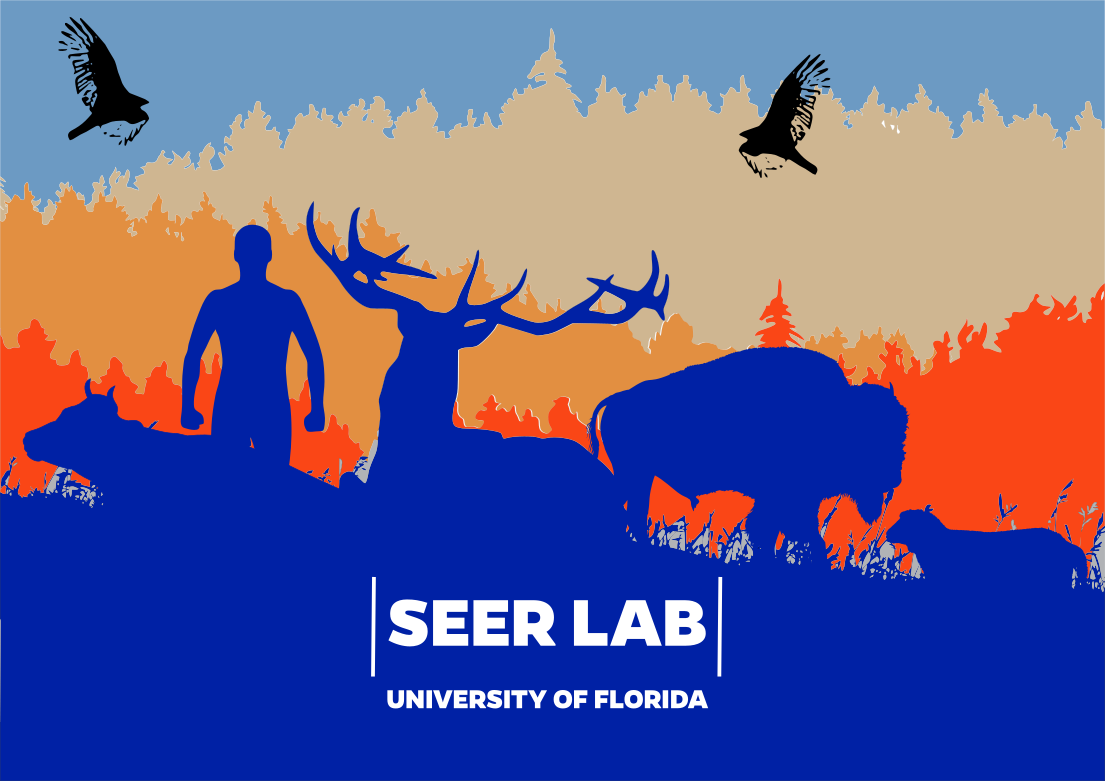
The Spatial Epidemiology & Ecology Research Laboratory (SEER Lab) is an interdisciplinary laboratory jointly housed in the Department of Geography and the Emerging Pathogens Institute at the University of Florida.
History of the SEER Lab
The lab was founded by Dr. Jason K. Blackburn in 2007 while on faculty in the Department of Geography at Cal State Fullerton. The SEER Lab moved to UF in July of 2009. Since 2011, SEER Lab has managed biosafety level 2 (BSL-2) and BSL-3 laboratory spaces to link pathogen microbiology and molecular biology with geospatial analyses. In November 2011, with the help of SEER Lab Adjunct Professor Dr. Ted Hadfield, the lab established the Martin E. Hugh-Jones Bacillus anthracis Collection, and we have expanded the bacterial collection across its geographic and host range. Today, the collection includes a wide range of Brucella spp., Clostridium botulinum, and Bacillus cereus biovar anthracis (the latest described Bacillus species that causes anthrax like infection). SEER Lab is focused on questions addressing the ecology and spatio-temporal patterns of diseases. SEER Lab research is focused primarily on bacterial zoonoses, those bacterial diseases that affect both animals and humans. Toward these research questions, SEER Lab employs spatial modeling and geographic information systems (GIS), remote sensing (e.g., satellite data describing the environment), and micro- and molecular biology.
The lab has a significant international network of collaborators across many parts of the former Soviet Union, including Kazakhstan, Kyrgyzstan, Azerbaijan, Georgia, Ukraine, West Africa, including Ghana and Nigeria, Kenya, Botswana, Australia, Vietnam, and Philippines. Lab faculty, staff, and students routinely travel or host collaborators and work on zoonotic disease problems in GIS Labs, biosafety labs, and field sites worldwide.
SEER Lab Research Facilities
SEER Lab | Geography (3304 Turlington Hall)
Our GIS facility in Turlington Hall on the main UF campus, houses research staff, postdocs, and graduate students. The lab maintains a state-of-the-art computer facility with several high-end PCs and access to the EPI Data Center. In 2023, the lab was overhauled to replace all computers with GPU-enabled PCs to ensure SEER Lab is part of the GeoAI revolution. SEER Lab is also a HiPerGator user, with many of our projects using supercomputing to process data. The lab promotes collaboration and brainstorming with multiple whiteboards and ample room for impromptu meetings. The lab also serves as a conference/meeting room for Lab-related training sessions and regularly hosts international visitors and collaborators. The lab can comfortably seat 10 people. SEER Lab is located in the main Geography Corridor on the 3rd floor and is fully integrated with the Department.
SEER Lab | EPI (Emerging Pathogens Institute)
A BSL-2 and BSL-3 certified select agent laboratory to support our research in the microbiology and molecular evolution of Bacillus anthracis. Our BSL-2 lab serves as our base for serological studies designed to detect exposure to the pathogen wildlife and livestock species. SEER Lab is actively collaborating with diagnostics companies to improve and implement serological tests that will support the wide range of wildlife species we study relative to anthrax across the US and Southern Africa. The BSL-3 facility supports our work with the pathogen, including our diagnostics for unknown or suspect samples. Additionally, this facility supports our molecular genetics studies, including sub-culturing and DNA extraction for safe export to our BSL-2 lab for genotyping and sequencing. SEER Lab can work from field collection of samples through to serological screening (antigens and antibodies), pathogen diagnostics (several pathogens), whole genome sequencing, and genome alignments. Since 2023, SEER Lab maintains a MinIon sequencer to expand our WGS sequencing capabilities. In this way, SEER Lab is a truly one-stop-shop for geospatial, phylogenetic, and microbiological characterization.